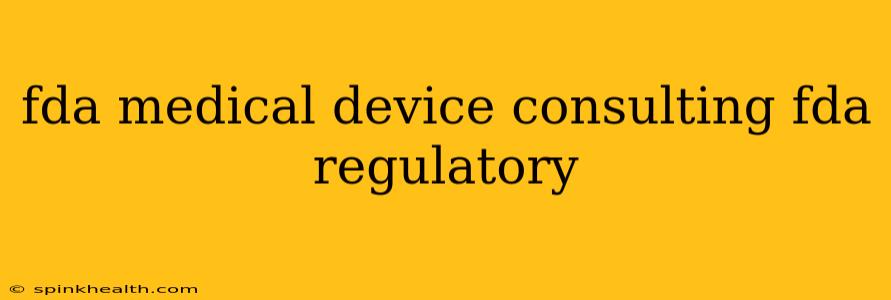The world of medical devices is complex, demanding, and fiercely regulated. Getting a medical device to market requires navigating a labyrinthine path of regulations, testing, and approvals. This is where FDA medical device consulting becomes invaluable. It's not just about meeting requirements; it's about understanding the why behind them, ensuring your product's safety and efficacy, and ultimately, saving lives.
My name is Alex, and I've spent over a decade helping companies navigate the FDA approval process. I've witnessed firsthand the frustration of unmet expectations and the triumph of successful launches. Let me share my insights, gleaned from years of experience and countless successful projects. This isn't just theory; it's real-world experience, tailored to help you understand the intricacies of FDA regulatory compliance.
What is FDA Medical Device Consulting?
FDA medical device consulting involves partnering with experts who possess in-depth knowledge of FDA regulations and the medical device development lifecycle. These consultants provide guidance throughout the entire process, from initial concept and design to final market approval and post-market surveillance. They act as your navigators, ensuring your product meets all necessary requirements and that you avoid costly mistakes.
Think of it as having a seasoned guide leading you through a treacherous jungle. They know the shortcuts, the dangers to avoid, and the most efficient route to your destination. They’re not just pointing out the path; they’re helping you clear obstacles and ensuring you arrive safely.
What are the Key Stages of FDA Medical Device Regulation?
The FDA regulatory pathway is a multi-stage process, and each stage requires meticulous attention to detail. One missed step can lead to significant delays, increased costs, and even rejection.
1. Classification: Determining your device's classification is the first crucial step. This determines the level of regulatory scrutiny your product will undergo. The classification is based on its intended use, risk level, and other factors.
2. Pre-Submission: Before submitting your application, thorough preparation is essential. This includes compiling all necessary data, documentation, and testing results. A consultant helps streamline this process, ensuring a smooth and efficient submission.
3. Submission: This is where your meticulously prepared application is submitted to the FDA. The type of submission (e.g., 510(k) for substantial equivalence, PMA for premarket approval) depends on your device's classification and risk level.
4. Review: The FDA reviews your submission, potentially requesting additional information or clarification. A strong submission, built with the help of a consultant, significantly improves your chances of a speedy and successful review.
5. Post-Market Surveillance: Even after approval, your responsibilities don't end. Continuous monitoring and reporting are crucial for maintaining compliance and ensuring the safety and efficacy of your device.
What are the Benefits of Using an FDA Medical Device Consultant?
The benefits extend far beyond simply meeting FDA requirements. A consultant brings a wealth of expertise that can significantly impact your bottom line:
- Reduced Time to Market: Navigating the regulatory landscape efficiently significantly reduces the time it takes to bring your product to market.
- Increased Success Rate: Expert guidance increases the likelihood of successful FDA approval, minimizing the risk of rejection and costly delays.
- Minimized Costs: Preventing costly mistakes early on significantly reduces overall project expenses.
- Strategic Planning: Consultants help develop comprehensive strategies for navigating the complex regulatory environment.
- Compliance Expertise: They provide up-to-date knowledge of ever-evolving regulations, ensuring you always meet current requirements.
What types of medical devices require FDA approval?
Most medical devices require some level of FDA oversight. The specific requirements depend on the device's classification (Class I, II, or III) which is based on its risk level. Class III devices, those that support life or are implanted, have the most stringent requirements. A consultant can guide you through this process and help you understand the specifics relevant to your device.
What are the potential penalties for non-compliance with FDA regulations?
Non-compliance can lead to severe consequences, including:
- Warning Letters: Formal letters from the FDA outlining deficiencies and requiring corrective actions.
- Recalls: Mandatory removal of your device from the market, resulting in significant financial losses and reputational damage.
- Fines: Substantial financial penalties imposed by the FDA.
- Criminal Charges: In cases of egregious violations, criminal charges can be filed.
Navigating the FDA regulatory pathway successfully requires careful planning and expert guidance. An FDA medical device consultant is more than just a cost; they are an investment in your product's success and your company's future. The potential risks of non-compliance far outweigh the cost of engaging experienced professionals. Choosing the right partner can mean the difference between success and failure in this highly regulated industry.

